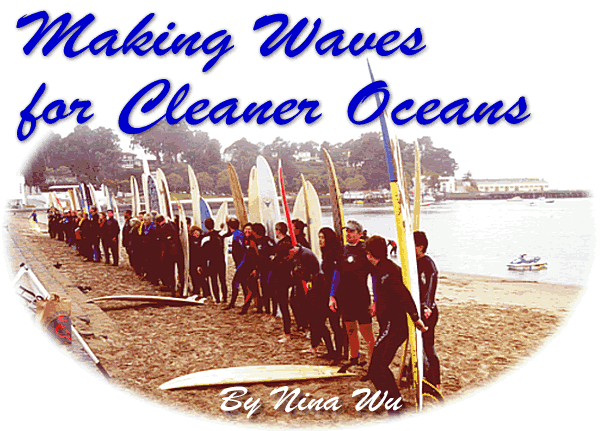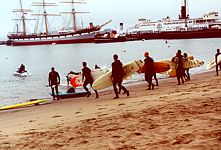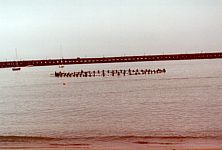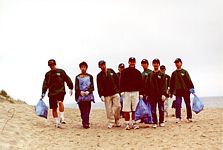
Early on a foggy Sunday morning at San Francisco Aquatic Park more than 60 surfers have shimmied into their wetsuits and brought their surfboards to the water's edge. But what motivates them this morning isn't the desire to catch a wave. It's the desire to take part in the annual Clean Water Day Paddle—a symbolic act of concern for the ocean, earth and environment.
Every year members of the Surfrider Foundation across the nation grab their surfboards and participate in the same paddle-out to raise community awareness about the plight of the oceans. Surfers from coast to coast paddle out in waterways from all along the Pacific Ocean to the Potomac River in Washington, D.C. Clean water is the primary emphasis, although coastal erosion, beach pollution and toxic dumping also rank high on the list of environmental concerns.
The Surfrider Foundation's National Campaign for Clean Water is part of a larger effort to support the B.E.A.C.H. (Beaches Environmental and Clean-up Act) bill, calling for an establishment of national criteria for beach water quality and better monitoring programs. But the main emphasis is on grassroots activism at the local level.
"Here in San Francisco Bay we've seen alarming levels of heavy metals and pesticides in fish, which to Surfrider is a red flag that there are problems with water quality," said San Francisco Chapter Chair Todd Walsh. "As environmental surfers, we're very concerned. We're trying to rally the community behind these issues and make it easier for people to get involved."
After a brief lineup, with surfboards of all shapes, sizes and colors standing upright in a row, the surfers headed out towards the 50-degree water. Like a flock of penguins, they paddled about 100 yards towards the middle of the water, formed a ceremonial circle and raised their hands in a unified whoop of delight.
It was like a bond," said Tom Hsieh, who was participating for the first time. "When those last two hands connected, it was like an energy chain. You felt sort of one with the environment and one with the water and everybody else."
After the circle, surfers followed three different paths depending on their level of skill. Advanced surfers took the loop towards Fort Point and back; intermediate surfers took the one-mile paddle around the breakwater; while grommets (surfer slang for beginning surfers) simply paddled out to the ceremonial circle and back.
Jason Labranch and Marianne Lu joined the paddle-out for the first time. "I've never participated, just given money before," said Labranch. Supporting the foundation "goes beyond just our own interest in surfing," he said. "It's unity, and everyone coming together towards one goal."
During the paddle, longtime surfers Daniel Estrella and Margarita Rhodes noticed a seagull caught in the hooks of a net and helped disentangle it. While Daniel held the bird to keep it still, Margarita extricated the hook from its mouth. They both watched as it flew away with its newfound freedom. This was their fourth time participating in the paddle-out.
"It's just a little way to give back," said Estrella. "The ocean gives us so much beauty and so many thrilling experiences, that you want to give back and you want to protect it." With huge sea stars past the breakwater, the view was absolutely beautiful this morning, he added.
Rhodes said she's seen some degree of irresponsibility among younger surfers within the last 10 years and she hopes Surfrider's efforts can help set an example for the new generation.
Where Surfing and Environmentalism Meet
"Being one with the ocean" is often quoted as the ultimate appeal of surfing, so it's not too surprising that a group of surfers from Malibu founded the Surfrider Foundation. It was back in 1984 and their concern was water quality; their friends were getting sick from polluted runoff.
In 1991 the foundation was registered as a non-profit group "dedicated to the protection and enjoyment of the world's waves, oceans and beaches through conservation, activism, research, and education." There are 48 chapters across the U.S. as well as chapters in Europe, Australia, Brazil and Asia. In addition to government lobbying, the foundation runs an educational arm called Respect the Beach and has a task force that monitors water quality.
Over the past 10 years, Surfrider has made a few milestones in its efforts to protect the health of the oceans. In 1991, the foundation won the second largest Clean Water Act suit in U.S. history against two pulp mills in Humboldt County, California. Following the suit, the Louisiana Pacific mill became the first in North America to produce totally chlorine-free (TCF) paper.
In 1995, the Foundation sued the City and County of Honolulu, Hawaii, for over 13,000 Clean Water Act violations at Kailua Bay. As a result of the suit, which was settled out of court, the city and county agreed to form an advisory council to monitor the area, research the use of ultraviolet cleansing of wastewater and upgrade the existing wastewater treatment plant.
Though not every surfer is an environmentalist, the two roles seem to go hand in hand. Some Surfrider members identified themselves as surfers first and environmentalists second; while others, who were primarily environmentalists, developed an interest in surfing over time. Still others perceived no difference between the two roles. To be a surfer is to be environmentally aware.
"We're the ones out there that notice the water quality problems first," said Surfrider's environmental coordinator, Mike Paquet.
Former San Francisco Surfrider Chair Clay Bennett said he doesn't label himself an environmentalist, though his involvement stems from surfing. "I would say there's a passion inside me, and from that comes surfing, and from that comes my feelings about the world," he said. "Right here at Ocean Beach, those things meet."
The Surfrider Foundation has 25,000 members nationwide and 800 right in the San Francisco Bay Area. With much local community support, it helps spawn smaller groups, like the Ocean Beach Task Force.
Besides the annual Clean Water Paddle, the San Francisco Surfrider Foundation holds monthly beach cleanups—they pick up about 50 pounds of trash a month—and fundraising events and rallies supporting coastal mapping and dune-habitat restoration. Currently the top issue concerning the local chapter is the protection of the beach south of Sloat Avenue.
Saving Ocean Beach: The Sloat Issue
Four years ago, when erosion threatened the Great Highway along the coast of San Francisco, the city's Department of Public Works (DPW) constructed a rock revetment on Ocean Beach near the south parking lot, which had eroded and started to fall onto the beach. In 1998 DPW extended and bolstered it with more rocks, ruining one of the best surf spots in the city.
Local surfers were shocked to see a favorite part of their beach suddenly disappear beneath the rocks. The Surfrider Foundation quickly organized an opposition to any further addition of rocks to the area, supporting the use of sand replenishment instead of hard structures for temporary erosion control. Their efforts paid off—at least, for now.
In the summer of 2000, the San Francisco Board of Supervisors sided with Surfrider by voting unanimously against any rock revetment or "hard" structures proposed by DPW.
Now the Foundation is keeping its eye on the proposed construction of a sea wall, which it also opposes, and is working with Ocean Beach Task Force, a city and community group, to come up with a better, long-term solution for the erosion problem.
"It's not just OK to wipe out a beach by dumping boulders on it," said Bennett, who now chairs the Ocean Beach Task Force subcommittee on Recreation and Beach Access. "Ocean Beach is a magical place. It's awesome, and the power of nature in the water is right there."
The Surfrider Foundation's vision is to have a group of people at every coastline looking after its protection and quality. The belief is that it all begins at the grassroots level with individuals ...
Sixty
people on a foggy Sunday morning paddling out—surfers who care about
clean water, the magic of the ocean, the mystery of the sea—sixty
individuals joined together by a vision. Maybe that is what it is all
about.
California Coastal Commission
San Francisco Regional Water Quality Web Page


